THE SUSTAINABLE CORPORATIONS
VerifiedAdded on 2022/08/27
|11
|2889
|35
AI Summary
Contribute Materials
Your contribution can guide someone’s learning journey. Share your
documents today.

Running head: SUSTAINABLE CORPORATIONS
Sustainable Corporations
Name of the Student:
Name of the University:
Author note:
Sustainable Corporations
Name of the Student:
Name of the University:
Author note:
Secure Best Marks with AI Grader
Need help grading? Try our AI Grader for instant feedback on your assignments.
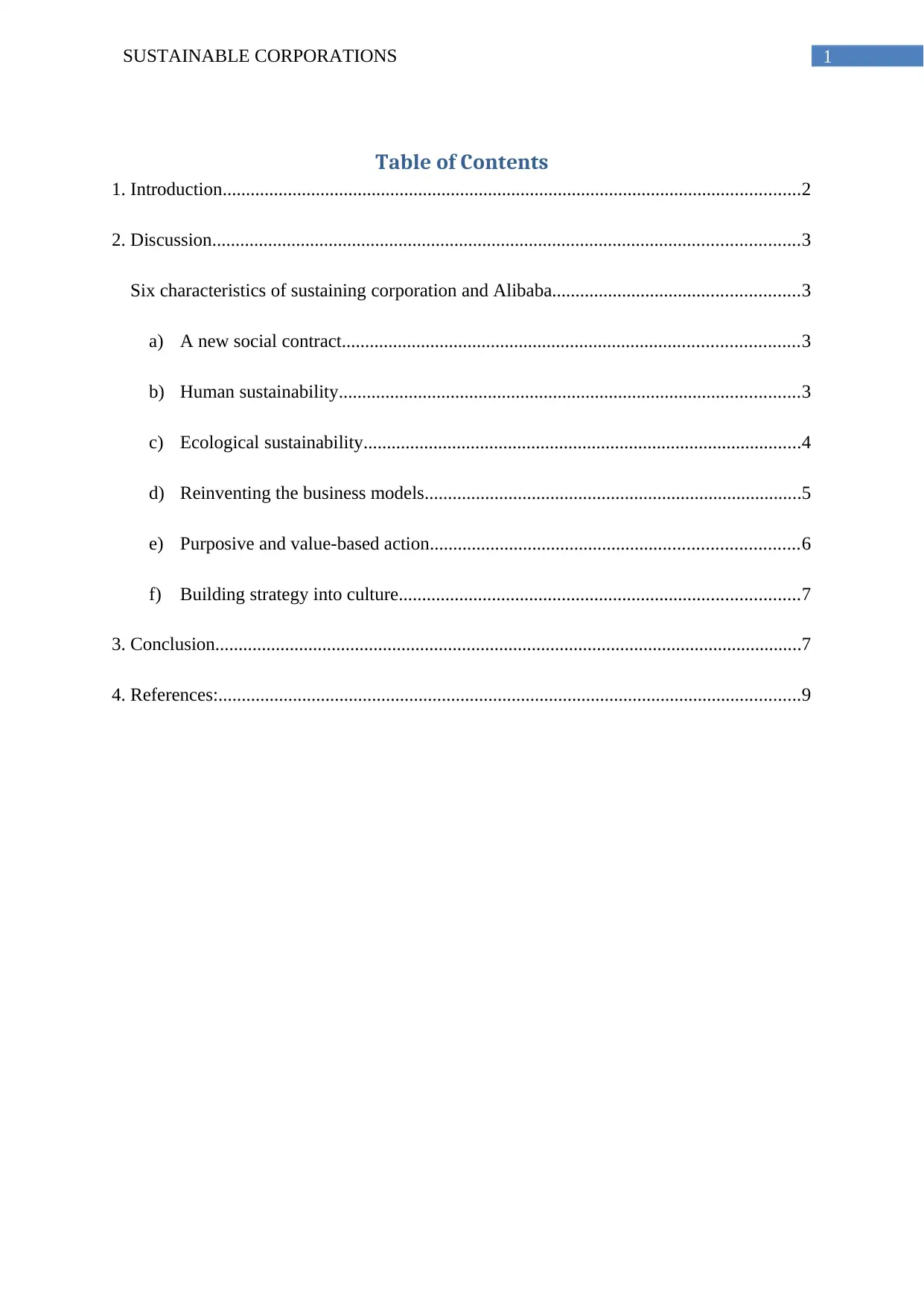
1SUSTAINABLE CORPORATIONS
Table of Contents
1. Introduction............................................................................................................................2
2. Discussion..............................................................................................................................3
Six characteristics of sustaining corporation and Alibaba.....................................................3
a) A new social contract..................................................................................................3
b) Human sustainability...................................................................................................3
c) Ecological sustainability..............................................................................................4
d) Reinventing the business models.................................................................................5
e) Purposive and value-based action...............................................................................6
f) Building strategy into culture......................................................................................7
3. Conclusion..............................................................................................................................7
4. References:.............................................................................................................................9
Table of Contents
1. Introduction............................................................................................................................2
2. Discussion..............................................................................................................................3
Six characteristics of sustaining corporation and Alibaba.....................................................3
a) A new social contract..................................................................................................3
b) Human sustainability...................................................................................................3
c) Ecological sustainability..............................................................................................4
d) Reinventing the business models.................................................................................5
e) Purposive and value-based action...............................................................................6
f) Building strategy into culture......................................................................................7
3. Conclusion..............................................................................................................................7
4. References:.............................................................................................................................9
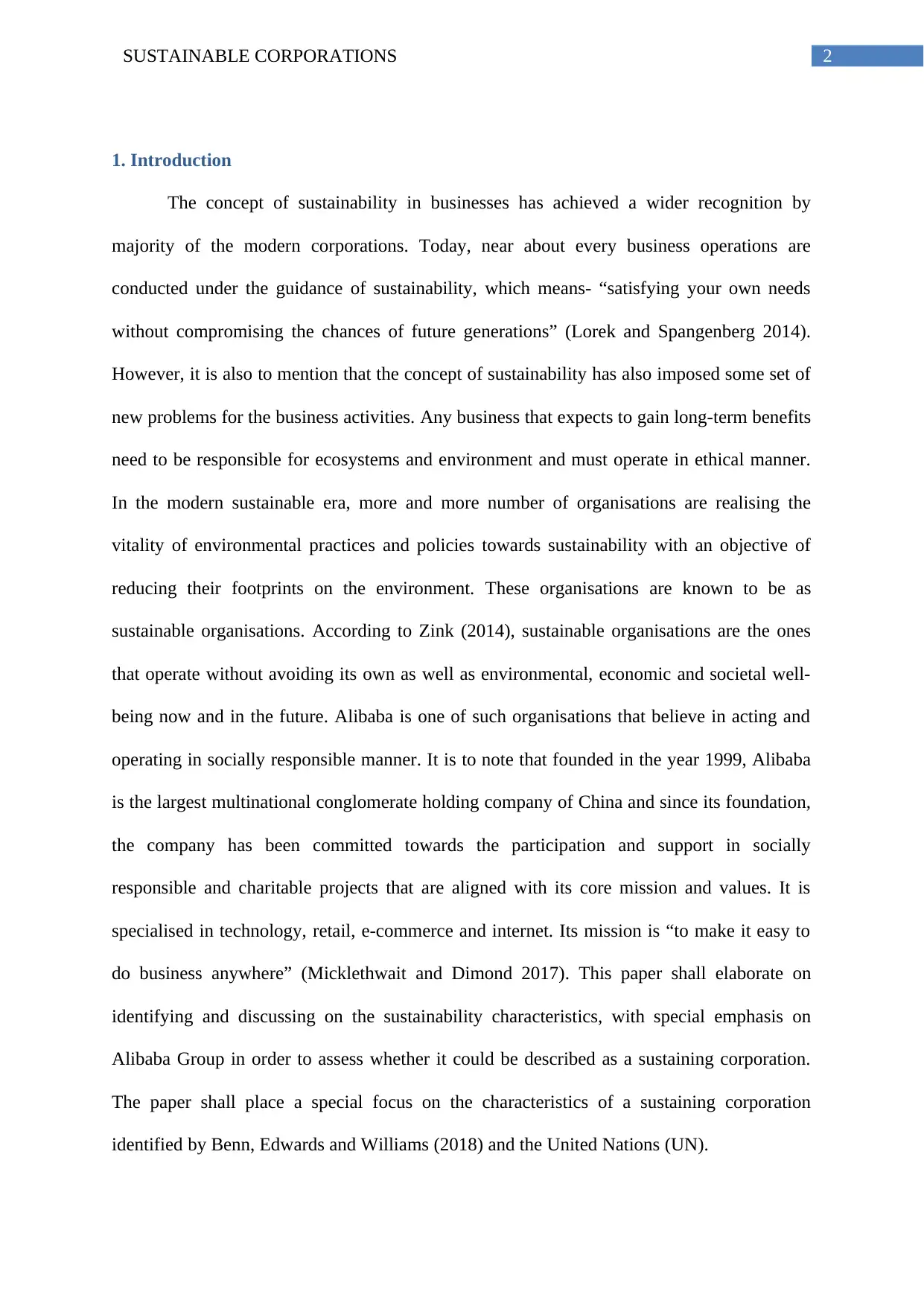
2SUSTAINABLE CORPORATIONS
1. Introduction
The concept of sustainability in businesses has achieved a wider recognition by
majority of the modern corporations. Today, near about every business operations are
conducted under the guidance of sustainability, which means- “satisfying your own needs
without compromising the chances of future generations” (Lorek and Spangenberg 2014).
However, it is also to mention that the concept of sustainability has also imposed some set of
new problems for the business activities. Any business that expects to gain long-term benefits
need to be responsible for ecosystems and environment and must operate in ethical manner.
In the modern sustainable era, more and more number of organisations are realising the
vitality of environmental practices and policies towards sustainability with an objective of
reducing their footprints on the environment. These organisations are known to be as
sustainable organisations. According to Zink (2014), sustainable organisations are the ones
that operate without avoiding its own as well as environmental, economic and societal well-
being now and in the future. Alibaba is one of such organisations that believe in acting and
operating in socially responsible manner. It is to note that founded in the year 1999, Alibaba
is the largest multinational conglomerate holding company of China and since its foundation,
the company has been committed towards the participation and support in socially
responsible and charitable projects that are aligned with its core mission and values. It is
specialised in technology, retail, e-commerce and internet. Its mission is “to make it easy to
do business anywhere” (Micklethwait and Dimond 2017). This paper shall elaborate on
identifying and discussing on the sustainability characteristics, with special emphasis on
Alibaba Group in order to assess whether it could be described as a sustaining corporation.
The paper shall place a special focus on the characteristics of a sustaining corporation
identified by Benn, Edwards and Williams (2018) and the United Nations (UN).
1. Introduction
The concept of sustainability in businesses has achieved a wider recognition by
majority of the modern corporations. Today, near about every business operations are
conducted under the guidance of sustainability, which means- “satisfying your own needs
without compromising the chances of future generations” (Lorek and Spangenberg 2014).
However, it is also to mention that the concept of sustainability has also imposed some set of
new problems for the business activities. Any business that expects to gain long-term benefits
need to be responsible for ecosystems and environment and must operate in ethical manner.
In the modern sustainable era, more and more number of organisations are realising the
vitality of environmental practices and policies towards sustainability with an objective of
reducing their footprints on the environment. These organisations are known to be as
sustainable organisations. According to Zink (2014), sustainable organisations are the ones
that operate without avoiding its own as well as environmental, economic and societal well-
being now and in the future. Alibaba is one of such organisations that believe in acting and
operating in socially responsible manner. It is to note that founded in the year 1999, Alibaba
is the largest multinational conglomerate holding company of China and since its foundation,
the company has been committed towards the participation and support in socially
responsible and charitable projects that are aligned with its core mission and values. It is
specialised in technology, retail, e-commerce and internet. Its mission is “to make it easy to
do business anywhere” (Micklethwait and Dimond 2017). This paper shall elaborate on
identifying and discussing on the sustainability characteristics, with special emphasis on
Alibaba Group in order to assess whether it could be described as a sustaining corporation.
The paper shall place a special focus on the characteristics of a sustaining corporation
identified by Benn, Edwards and Williams (2018) and the United Nations (UN).
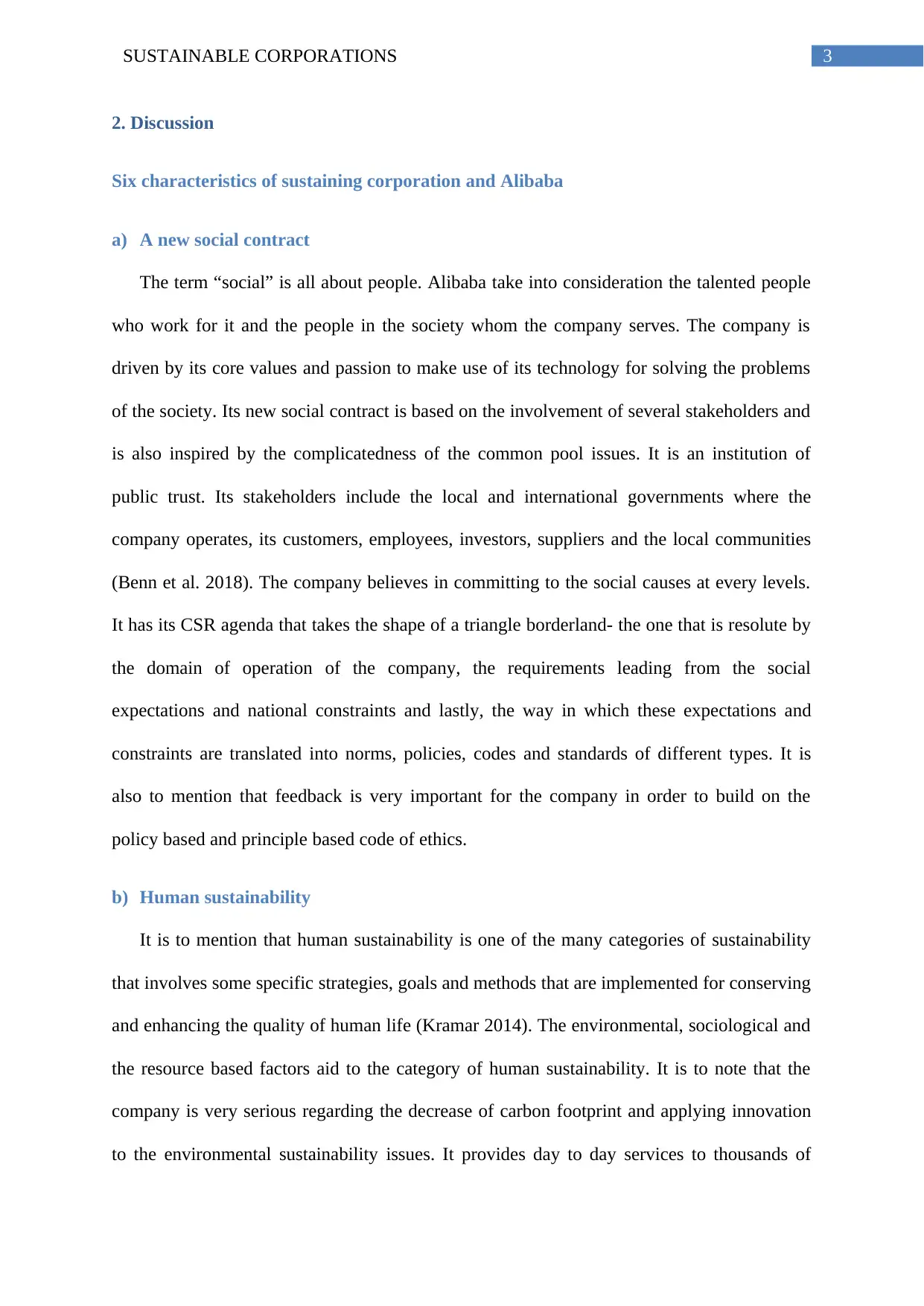
3SUSTAINABLE CORPORATIONS
2. Discussion
Six characteristics of sustaining corporation and Alibaba
a) A new social contract
The term “social” is all about people. Alibaba take into consideration the talented people
who work for it and the people in the society whom the company serves. The company is
driven by its core values and passion to make use of its technology for solving the problems
of the society. Its new social contract is based on the involvement of several stakeholders and
is also inspired by the complicatedness of the common pool issues. It is an institution of
public trust. Its stakeholders include the local and international governments where the
company operates, its customers, employees, investors, suppliers and the local communities
(Benn et al. 2018). The company believes in committing to the social causes at every levels.
It has its CSR agenda that takes the shape of a triangle borderland- the one that is resolute by
the domain of operation of the company, the requirements leading from the social
expectations and national constraints and lastly, the way in which these expectations and
constraints are translated into norms, policies, codes and standards of different types. It is
also to mention that feedback is very important for the company in order to build on the
policy based and principle based code of ethics.
b) Human sustainability
It is to mention that human sustainability is one of the many categories of sustainability
that involves some specific strategies, goals and methods that are implemented for conserving
and enhancing the quality of human life (Kramar 2014). The environmental, sociological and
the resource based factors aid to the category of human sustainability. It is to note that the
company is very serious regarding the decrease of carbon footprint and applying innovation
to the environmental sustainability issues. It provides day to day services to thousands of
2. Discussion
Six characteristics of sustaining corporation and Alibaba
a) A new social contract
The term “social” is all about people. Alibaba take into consideration the talented people
who work for it and the people in the society whom the company serves. The company is
driven by its core values and passion to make use of its technology for solving the problems
of the society. Its new social contract is based on the involvement of several stakeholders and
is also inspired by the complicatedness of the common pool issues. It is an institution of
public trust. Its stakeholders include the local and international governments where the
company operates, its customers, employees, investors, suppliers and the local communities
(Benn et al. 2018). The company believes in committing to the social causes at every levels.
It has its CSR agenda that takes the shape of a triangle borderland- the one that is resolute by
the domain of operation of the company, the requirements leading from the social
expectations and national constraints and lastly, the way in which these expectations and
constraints are translated into norms, policies, codes and standards of different types. It is
also to mention that feedback is very important for the company in order to build on the
policy based and principle based code of ethics.
b) Human sustainability
It is to mention that human sustainability is one of the many categories of sustainability
that involves some specific strategies, goals and methods that are implemented for conserving
and enhancing the quality of human life (Kramar 2014). The environmental, sociological and
the resource based factors aid to the category of human sustainability. It is to note that the
company is very serious regarding the decrease of carbon footprint and applying innovation
to the environmental sustainability issues. It provides day to day services to thousands of
Secure Best Marks with AI Grader
Need help grading? Try our AI Grader for instant feedback on your assignments.
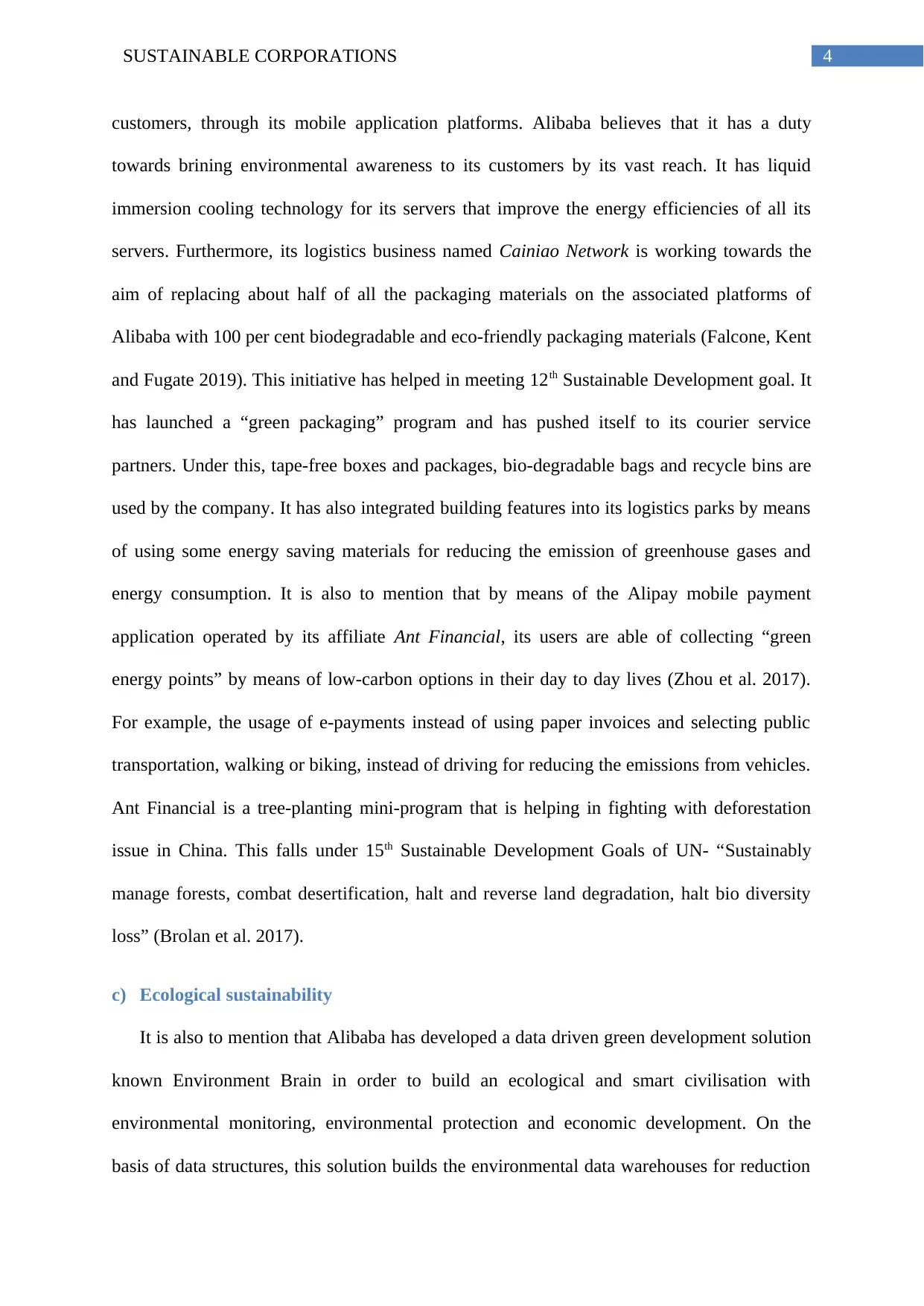
4SUSTAINABLE CORPORATIONS
customers, through its mobile application platforms. Alibaba believes that it has a duty
towards brining environmental awareness to its customers by its vast reach. It has liquid
immersion cooling technology for its servers that improve the energy efficiencies of all its
servers. Furthermore, its logistics business named Cainiao Network is working towards the
aim of replacing about half of all the packaging materials on the associated platforms of
Alibaba with 100 per cent biodegradable and eco-friendly packaging materials (Falcone, Kent
and Fugate 2019). This initiative has helped in meeting 12th Sustainable Development goal. It
has launched a “green packaging” program and has pushed itself to its courier service
partners. Under this, tape-free boxes and packages, bio-degradable bags and recycle bins are
used by the company. It has also integrated building features into its logistics parks by means
of using some energy saving materials for reducing the emission of greenhouse gases and
energy consumption. It is also to mention that by means of the Alipay mobile payment
application operated by its affiliate Ant Financial, its users are able of collecting “green
energy points” by means of low-carbon options in their day to day lives (Zhou et al. 2017).
For example, the usage of e-payments instead of using paper invoices and selecting public
transportation, walking or biking, instead of driving for reducing the emissions from vehicles.
Ant Financial is a tree-planting mini-program that is helping in fighting with deforestation
issue in China. This falls under 15th Sustainable Development Goals of UN- “Sustainably
manage forests, combat desertification, halt and reverse land degradation, halt bio diversity
loss” (Brolan et al. 2017).
c) Ecological sustainability
It is also to mention that Alibaba has developed a data driven green development solution
known Environment Brain in order to build an ecological and smart civilisation with
environmental monitoring, environmental protection and economic development. On the
basis of data structures, this solution builds the environmental data warehouses for reduction
customers, through its mobile application platforms. Alibaba believes that it has a duty
towards brining environmental awareness to its customers by its vast reach. It has liquid
immersion cooling technology for its servers that improve the energy efficiencies of all its
servers. Furthermore, its logistics business named Cainiao Network is working towards the
aim of replacing about half of all the packaging materials on the associated platforms of
Alibaba with 100 per cent biodegradable and eco-friendly packaging materials (Falcone, Kent
and Fugate 2019). This initiative has helped in meeting 12th Sustainable Development goal. It
has launched a “green packaging” program and has pushed itself to its courier service
partners. Under this, tape-free boxes and packages, bio-degradable bags and recycle bins are
used by the company. It has also integrated building features into its logistics parks by means
of using some energy saving materials for reducing the emission of greenhouse gases and
energy consumption. It is also to mention that by means of the Alipay mobile payment
application operated by its affiliate Ant Financial, its users are able of collecting “green
energy points” by means of low-carbon options in their day to day lives (Zhou et al. 2017).
For example, the usage of e-payments instead of using paper invoices and selecting public
transportation, walking or biking, instead of driving for reducing the emissions from vehicles.
Ant Financial is a tree-planting mini-program that is helping in fighting with deforestation
issue in China. This falls under 15th Sustainable Development Goals of UN- “Sustainably
manage forests, combat desertification, halt and reverse land degradation, halt bio diversity
loss” (Brolan et al. 2017).
c) Ecological sustainability
It is also to mention that Alibaba has developed a data driven green development solution
known Environment Brain in order to build an ecological and smart civilisation with
environmental monitoring, environmental protection and economic development. On the
basis of data structures, this solution builds the environmental data warehouses for reduction
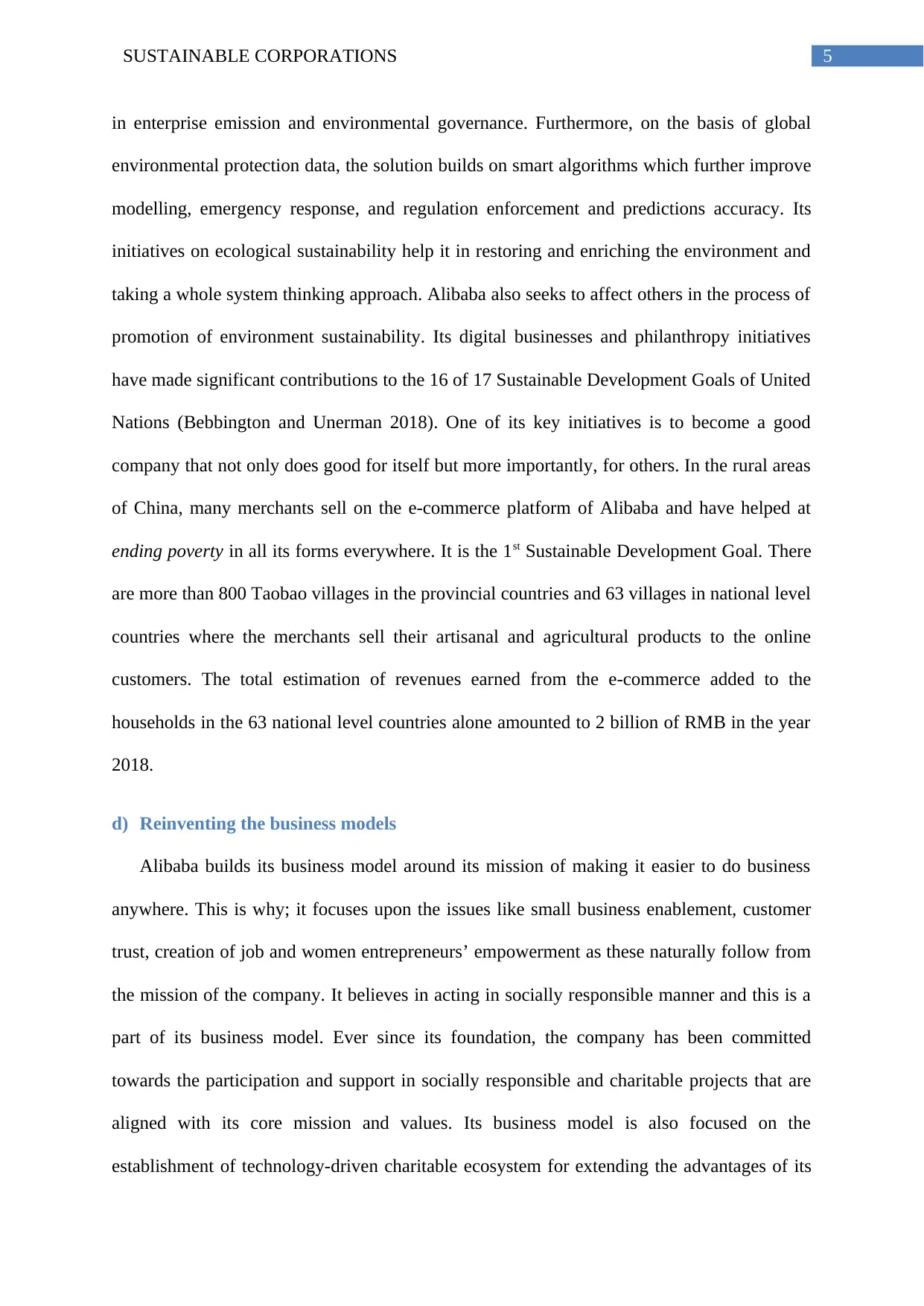
5SUSTAINABLE CORPORATIONS
in enterprise emission and environmental governance. Furthermore, on the basis of global
environmental protection data, the solution builds on smart algorithms which further improve
modelling, emergency response, and regulation enforcement and predictions accuracy. Its
initiatives on ecological sustainability help it in restoring and enriching the environment and
taking a whole system thinking approach. Alibaba also seeks to affect others in the process of
promotion of environment sustainability. Its digital businesses and philanthropy initiatives
have made significant contributions to the 16 of 17 Sustainable Development Goals of United
Nations (Bebbington and Unerman 2018). One of its key initiatives is to become a good
company that not only does good for itself but more importantly, for others. In the rural areas
of China, many merchants sell on the e-commerce platform of Alibaba and have helped at
ending poverty in all its forms everywhere. It is the 1st Sustainable Development Goal. There
are more than 800 Taobao villages in the provincial countries and 63 villages in national level
countries where the merchants sell their artisanal and agricultural products to the online
customers. The total estimation of revenues earned from the e-commerce added to the
households in the 63 national level countries alone amounted to 2 billion of RMB in the year
2018.
d) Reinventing the business models
Alibaba builds its business model around its mission of making it easier to do business
anywhere. This is why; it focuses upon the issues like small business enablement, customer
trust, creation of job and women entrepreneurs’ empowerment as these naturally follow from
the mission of the company. It believes in acting in socially responsible manner and this is a
part of its business model. Ever since its foundation, the company has been committed
towards the participation and support in socially responsible and charitable projects that are
aligned with its core mission and values. Its business model is also focused on the
establishment of technology-driven charitable ecosystem for extending the advantages of its
in enterprise emission and environmental governance. Furthermore, on the basis of global
environmental protection data, the solution builds on smart algorithms which further improve
modelling, emergency response, and regulation enforcement and predictions accuracy. Its
initiatives on ecological sustainability help it in restoring and enriching the environment and
taking a whole system thinking approach. Alibaba also seeks to affect others in the process of
promotion of environment sustainability. Its digital businesses and philanthropy initiatives
have made significant contributions to the 16 of 17 Sustainable Development Goals of United
Nations (Bebbington and Unerman 2018). One of its key initiatives is to become a good
company that not only does good for itself but more importantly, for others. In the rural areas
of China, many merchants sell on the e-commerce platform of Alibaba and have helped at
ending poverty in all its forms everywhere. It is the 1st Sustainable Development Goal. There
are more than 800 Taobao villages in the provincial countries and 63 villages in national level
countries where the merchants sell their artisanal and agricultural products to the online
customers. The total estimation of revenues earned from the e-commerce added to the
households in the 63 national level countries alone amounted to 2 billion of RMB in the year
2018.
d) Reinventing the business models
Alibaba builds its business model around its mission of making it easier to do business
anywhere. This is why; it focuses upon the issues like small business enablement, customer
trust, creation of job and women entrepreneurs’ empowerment as these naturally follow from
the mission of the company. It believes in acting in socially responsible manner and this is a
part of its business model. Ever since its foundation, the company has been committed
towards the participation and support in socially responsible and charitable projects that are
aligned with its core mission and values. Its business model is also focused on the
establishment of technology-driven charitable ecosystem for extending the advantages of its
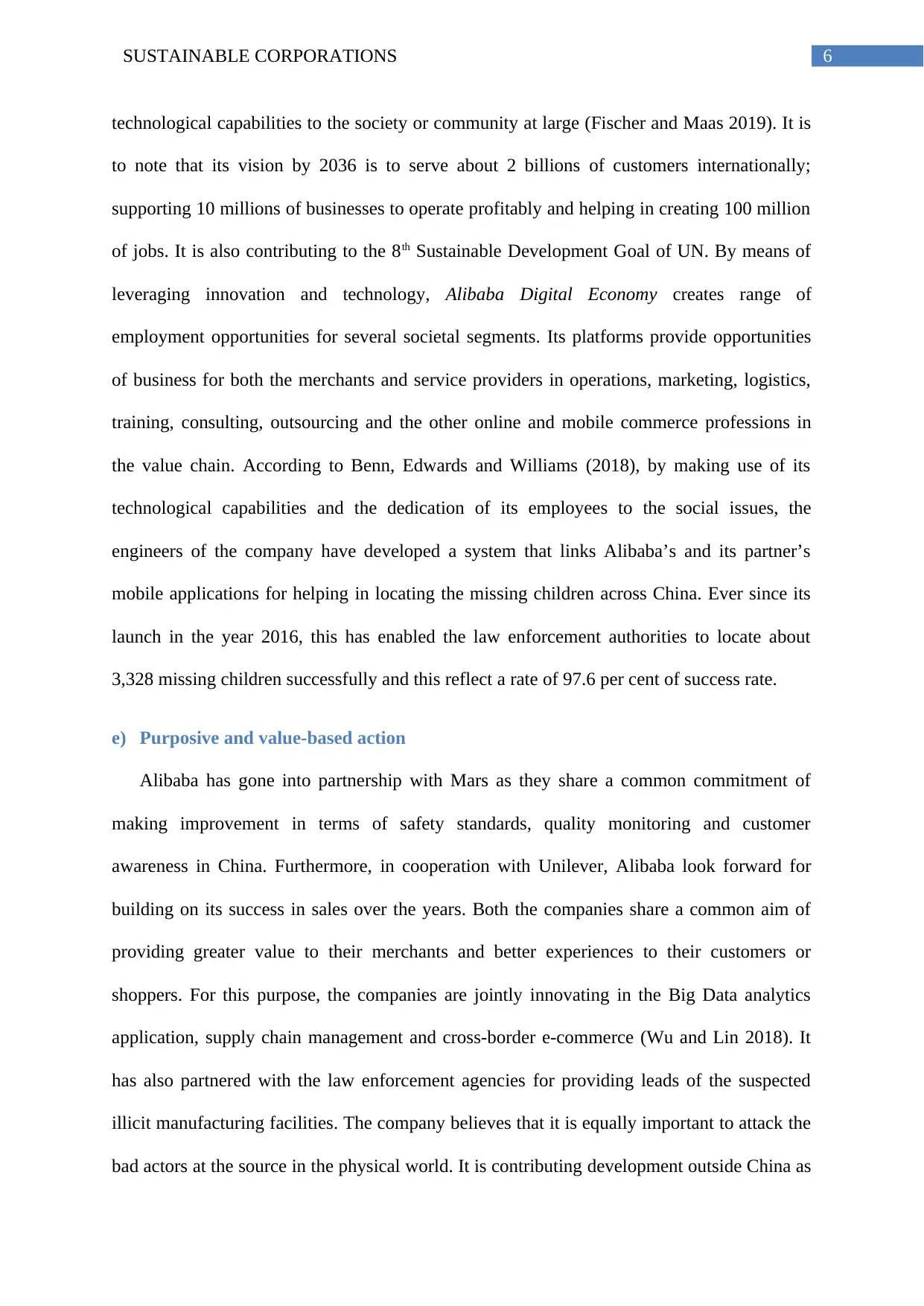
6SUSTAINABLE CORPORATIONS
technological capabilities to the society or community at large (Fischer and Maas 2019). It is
to note that its vision by 2036 is to serve about 2 billions of customers internationally;
supporting 10 millions of businesses to operate profitably and helping in creating 100 million
of jobs. It is also contributing to the 8th Sustainable Development Goal of UN. By means of
leveraging innovation and technology, Alibaba Digital Economy creates range of
employment opportunities for several societal segments. Its platforms provide opportunities
of business for both the merchants and service providers in operations, marketing, logistics,
training, consulting, outsourcing and the other online and mobile commerce professions in
the value chain. According to Benn, Edwards and Williams (2018), by making use of its
technological capabilities and the dedication of its employees to the social issues, the
engineers of the company have developed a system that links Alibaba’s and its partner’s
mobile applications for helping in locating the missing children across China. Ever since its
launch in the year 2016, this has enabled the law enforcement authorities to locate about
3,328 missing children successfully and this reflect a rate of 97.6 per cent of success rate.
e) Purposive and value-based action
Alibaba has gone into partnership with Mars as they share a common commitment of
making improvement in terms of safety standards, quality monitoring and customer
awareness in China. Furthermore, in cooperation with Unilever, Alibaba look forward for
building on its success in sales over the years. Both the companies share a common aim of
providing greater value to their merchants and better experiences to their customers or
shoppers. For this purpose, the companies are jointly innovating in the Big Data analytics
application, supply chain management and cross-border e-commerce (Wu and Lin 2018). It
has also partnered with the law enforcement agencies for providing leads of the suspected
illicit manufacturing facilities. The company believes that it is equally important to attack the
bad actors at the source in the physical world. It is contributing development outside China as
technological capabilities to the society or community at large (Fischer and Maas 2019). It is
to note that its vision by 2036 is to serve about 2 billions of customers internationally;
supporting 10 millions of businesses to operate profitably and helping in creating 100 million
of jobs. It is also contributing to the 8th Sustainable Development Goal of UN. By means of
leveraging innovation and technology, Alibaba Digital Economy creates range of
employment opportunities for several societal segments. Its platforms provide opportunities
of business for both the merchants and service providers in operations, marketing, logistics,
training, consulting, outsourcing and the other online and mobile commerce professions in
the value chain. According to Benn, Edwards and Williams (2018), by making use of its
technological capabilities and the dedication of its employees to the social issues, the
engineers of the company have developed a system that links Alibaba’s and its partner’s
mobile applications for helping in locating the missing children across China. Ever since its
launch in the year 2016, this has enabled the law enforcement authorities to locate about
3,328 missing children successfully and this reflect a rate of 97.6 per cent of success rate.
e) Purposive and value-based action
Alibaba has gone into partnership with Mars as they share a common commitment of
making improvement in terms of safety standards, quality monitoring and customer
awareness in China. Furthermore, in cooperation with Unilever, Alibaba look forward for
building on its success in sales over the years. Both the companies share a common aim of
providing greater value to their merchants and better experiences to their customers or
shoppers. For this purpose, the companies are jointly innovating in the Big Data analytics
application, supply chain management and cross-border e-commerce (Wu and Lin 2018). It
has also partnered with the law enforcement agencies for providing leads of the suspected
illicit manufacturing facilities. The company believes that it is equally important to attack the
bad actors at the source in the physical world. It is contributing development outside China as
Paraphrase This Document
Need a fresh take? Get an instant paraphrase of this document with our AI Paraphraser
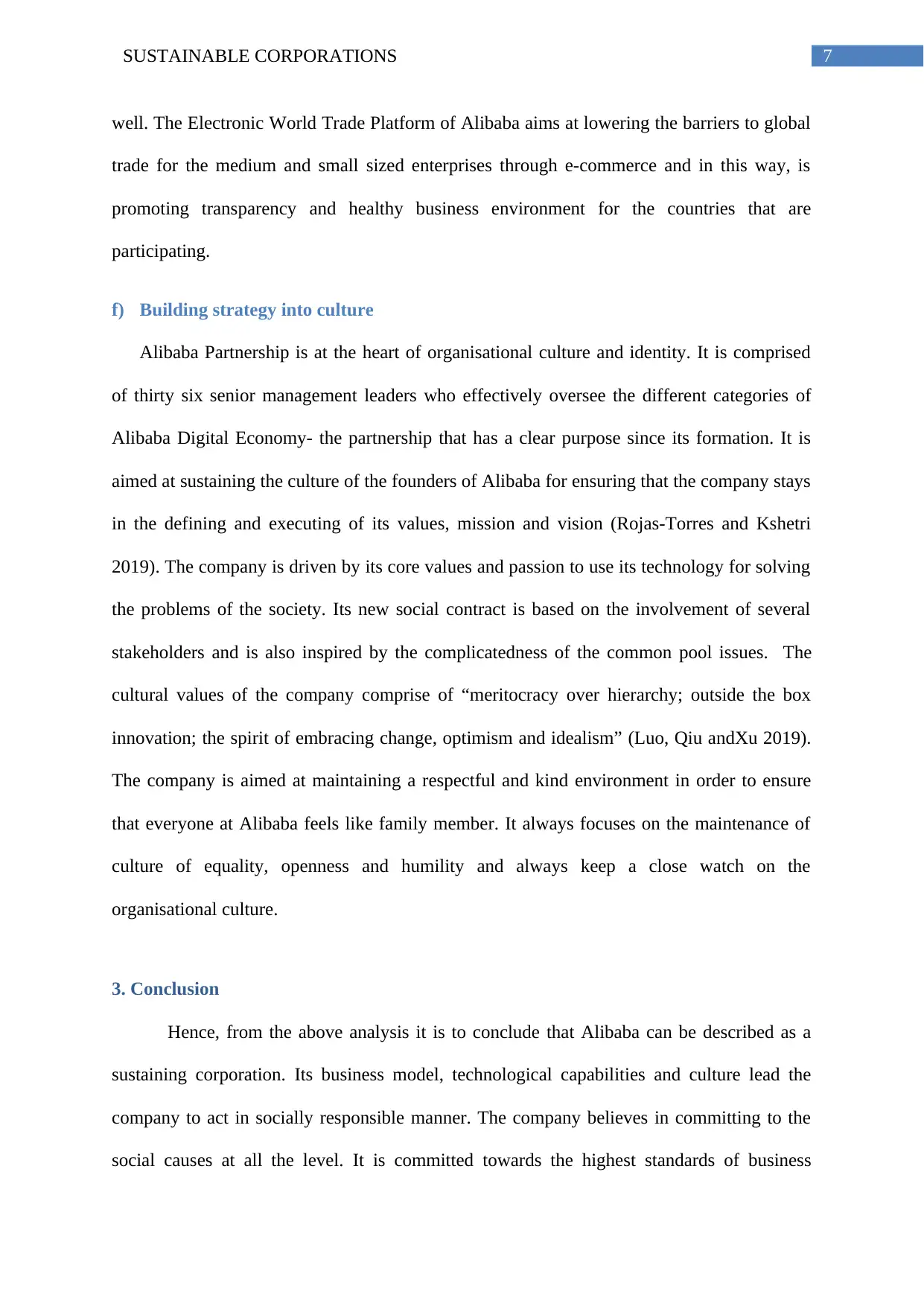
7SUSTAINABLE CORPORATIONS
well. The Electronic World Trade Platform of Alibaba aims at lowering the barriers to global
trade for the medium and small sized enterprises through e-commerce and in this way, is
promoting transparency and healthy business environment for the countries that are
participating.
f) Building strategy into culture
Alibaba Partnership is at the heart of organisational culture and identity. It is comprised
of thirty six senior management leaders who effectively oversee the different categories of
Alibaba Digital Economy- the partnership that has a clear purpose since its formation. It is
aimed at sustaining the culture of the founders of Alibaba for ensuring that the company stays
in the defining and executing of its values, mission and vision (Rojas-Torres and Kshetri
2019). The company is driven by its core values and passion to use its technology for solving
the problems of the society. Its new social contract is based on the involvement of several
stakeholders and is also inspired by the complicatedness of the common pool issues. The
cultural values of the company comprise of “meritocracy over hierarchy; outside the box
innovation; the spirit of embracing change, optimism and idealism” (Luo, Qiu andXu 2019).
The company is aimed at maintaining a respectful and kind environment in order to ensure
that everyone at Alibaba feels like family member. It always focuses on the maintenance of
culture of equality, openness and humility and always keep a close watch on the
organisational culture.
3. Conclusion
Hence, from the above analysis it is to conclude that Alibaba can be described as a
sustaining corporation. Its business model, technological capabilities and culture lead the
company to act in socially responsible manner. The company believes in committing to the
social causes at all the level. It is committed towards the highest standards of business
well. The Electronic World Trade Platform of Alibaba aims at lowering the barriers to global
trade for the medium and small sized enterprises through e-commerce and in this way, is
promoting transparency and healthy business environment for the countries that are
participating.
f) Building strategy into culture
Alibaba Partnership is at the heart of organisational culture and identity. It is comprised
of thirty six senior management leaders who effectively oversee the different categories of
Alibaba Digital Economy- the partnership that has a clear purpose since its formation. It is
aimed at sustaining the culture of the founders of Alibaba for ensuring that the company stays
in the defining and executing of its values, mission and vision (Rojas-Torres and Kshetri
2019). The company is driven by its core values and passion to use its technology for solving
the problems of the society. Its new social contract is based on the involvement of several
stakeholders and is also inspired by the complicatedness of the common pool issues. The
cultural values of the company comprise of “meritocracy over hierarchy; outside the box
innovation; the spirit of embracing change, optimism and idealism” (Luo, Qiu andXu 2019).
The company is aimed at maintaining a respectful and kind environment in order to ensure
that everyone at Alibaba feels like family member. It always focuses on the maintenance of
culture of equality, openness and humility and always keep a close watch on the
organisational culture.
3. Conclusion
Hence, from the above analysis it is to conclude that Alibaba can be described as a
sustaining corporation. Its business model, technological capabilities and culture lead the
company to act in socially responsible manner. The company believes in committing to the
social causes at all the level. It is committed towards the highest standards of business
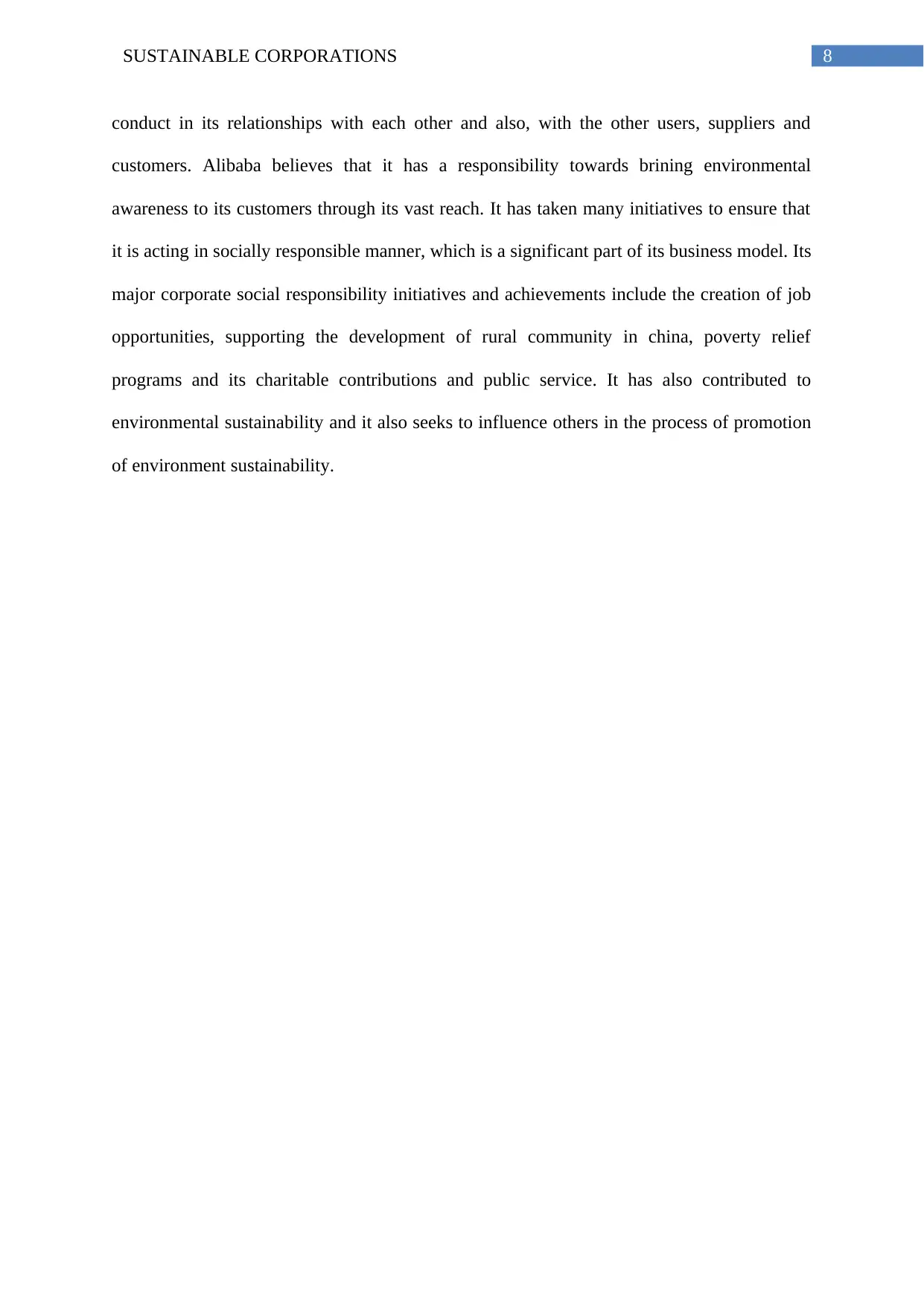
8SUSTAINABLE CORPORATIONS
conduct in its relationships with each other and also, with the other users, suppliers and
customers. Alibaba believes that it has a responsibility towards brining environmental
awareness to its customers through its vast reach. It has taken many initiatives to ensure that
it is acting in socially responsible manner, which is a significant part of its business model. Its
major corporate social responsibility initiatives and achievements include the creation of job
opportunities, supporting the development of rural community in china, poverty relief
programs and its charitable contributions and public service. It has also contributed to
environmental sustainability and it also seeks to influence others in the process of promotion
of environment sustainability.
conduct in its relationships with each other and also, with the other users, suppliers and
customers. Alibaba believes that it has a responsibility towards brining environmental
awareness to its customers through its vast reach. It has taken many initiatives to ensure that
it is acting in socially responsible manner, which is a significant part of its business model. Its
major corporate social responsibility initiatives and achievements include the creation of job
opportunities, supporting the development of rural community in china, poverty relief
programs and its charitable contributions and public service. It has also contributed to
environmental sustainability and it also seeks to influence others in the process of promotion
of environment sustainability.
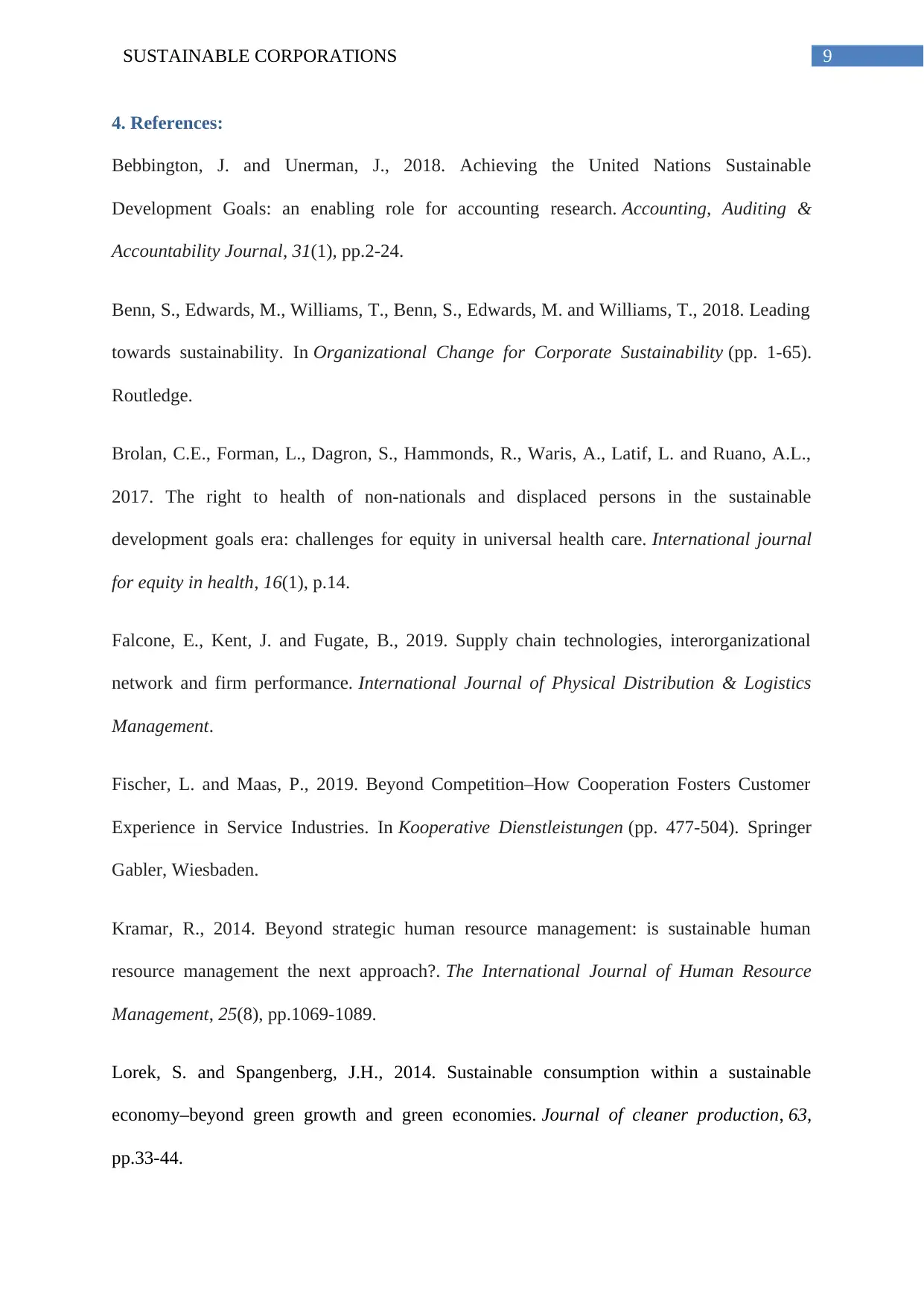
9SUSTAINABLE CORPORATIONS
4. References:
Bebbington, J. and Unerman, J., 2018. Achieving the United Nations Sustainable
Development Goals: an enabling role for accounting research. Accounting, Auditing &
Accountability Journal, 31(1), pp.2-24.
Benn, S., Edwards, M., Williams, T., Benn, S., Edwards, M. and Williams, T., 2018. Leading
towards sustainability. In Organizational Change for Corporate Sustainability (pp. 1-65).
Routledge.
Brolan, C.E., Forman, L., Dagron, S., Hammonds, R., Waris, A., Latif, L. and Ruano, A.L.,
2017. The right to health of non-nationals and displaced persons in the sustainable
development goals era: challenges for equity in universal health care. International journal
for equity in health, 16(1), p.14.
Falcone, E., Kent, J. and Fugate, B., 2019. Supply chain technologies, interorganizational
network and firm performance. International Journal of Physical Distribution & Logistics
Management.
Fischer, L. and Maas, P., 2019. Beyond Competition–How Cooperation Fosters Customer
Experience in Service Industries. In Kooperative Dienstleistungen (pp. 477-504). Springer
Gabler, Wiesbaden.
Kramar, R., 2014. Beyond strategic human resource management: is sustainable human
resource management the next approach?. The International Journal of Human Resource
Management, 25(8), pp.1069-1089.
Lorek, S. and Spangenberg, J.H., 2014. Sustainable consumption within a sustainable
economy–beyond green growth and green economies. Journal of cleaner production, 63,
pp.33-44.
4. References:
Bebbington, J. and Unerman, J., 2018. Achieving the United Nations Sustainable
Development Goals: an enabling role for accounting research. Accounting, Auditing &
Accountability Journal, 31(1), pp.2-24.
Benn, S., Edwards, M., Williams, T., Benn, S., Edwards, M. and Williams, T., 2018. Leading
towards sustainability. In Organizational Change for Corporate Sustainability (pp. 1-65).
Routledge.
Brolan, C.E., Forman, L., Dagron, S., Hammonds, R., Waris, A., Latif, L. and Ruano, A.L.,
2017. The right to health of non-nationals and displaced persons in the sustainable
development goals era: challenges for equity in universal health care. International journal
for equity in health, 16(1), p.14.
Falcone, E., Kent, J. and Fugate, B., 2019. Supply chain technologies, interorganizational
network and firm performance. International Journal of Physical Distribution & Logistics
Management.
Fischer, L. and Maas, P., 2019. Beyond Competition–How Cooperation Fosters Customer
Experience in Service Industries. In Kooperative Dienstleistungen (pp. 477-504). Springer
Gabler, Wiesbaden.
Kramar, R., 2014. Beyond strategic human resource management: is sustainable human
resource management the next approach?. The International Journal of Human Resource
Management, 25(8), pp.1069-1089.
Lorek, S. and Spangenberg, J.H., 2014. Sustainable consumption within a sustainable
economy–beyond green growth and green economies. Journal of cleaner production, 63,
pp.33-44.
Secure Best Marks with AI Grader
Need help grading? Try our AI Grader for instant feedback on your assignments.
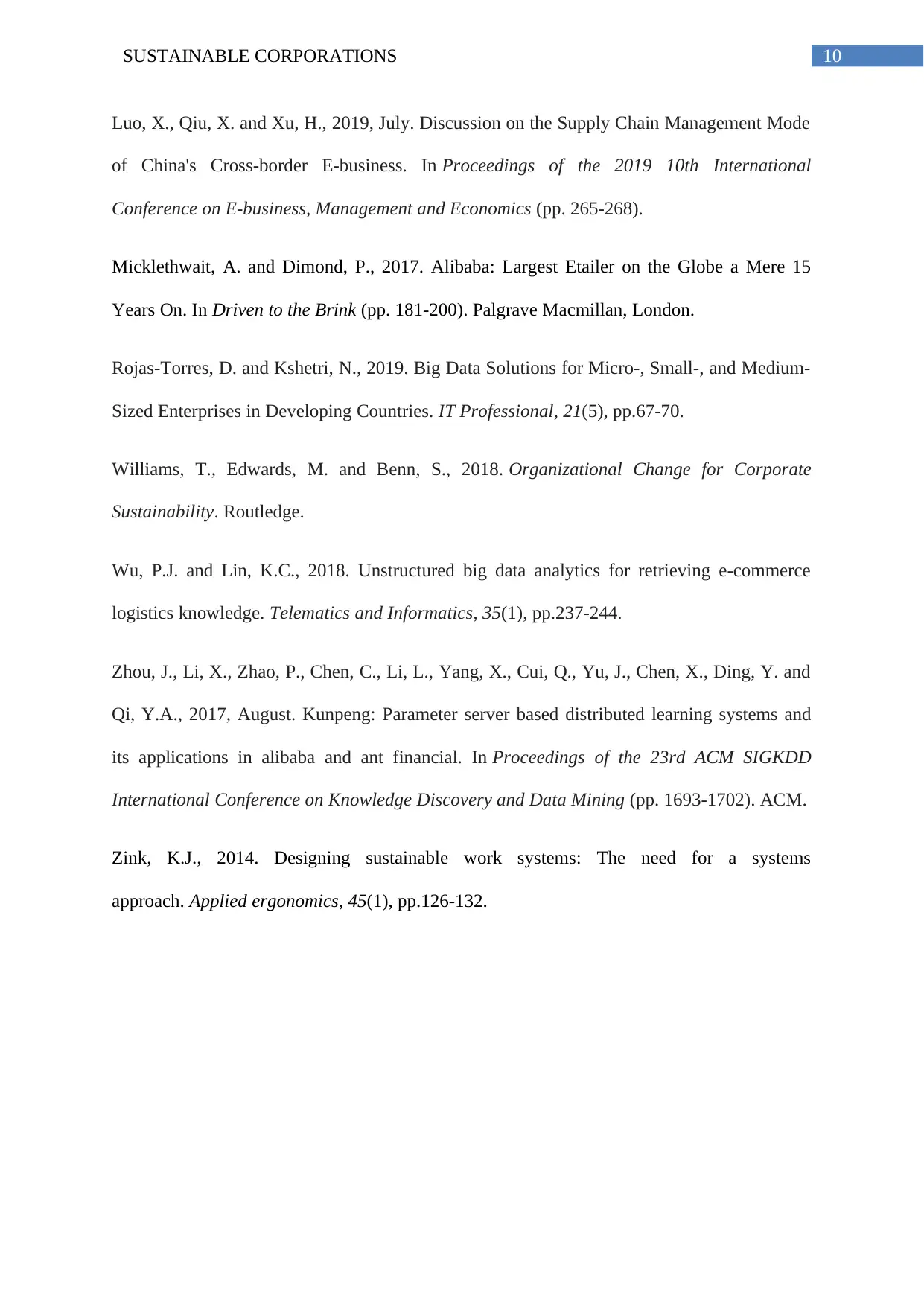
10SUSTAINABLE CORPORATIONS
Luo, X., Qiu, X. and Xu, H., 2019, July. Discussion on the Supply Chain Management Mode
of China's Cross-border E-business. In Proceedings of the 2019 10th International
Conference on E-business, Management and Economics (pp. 265-268).
Micklethwait, A. and Dimond, P., 2017. Alibaba: Largest Etailer on the Globe a Mere 15
Years On. In Driven to the Brink (pp. 181-200). Palgrave Macmillan, London.
Rojas-Torres, D. and Kshetri, N., 2019. Big Data Solutions for Micro-, Small-, and Medium-
Sized Enterprises in Developing Countries. IT Professional, 21(5), pp.67-70.
Williams, T., Edwards, M. and Benn, S., 2018. Organizational Change for Corporate
Sustainability. Routledge.
Wu, P.J. and Lin, K.C., 2018. Unstructured big data analytics for retrieving e-commerce
logistics knowledge. Telematics and Informatics, 35(1), pp.237-244.
Zhou, J., Li, X., Zhao, P., Chen, C., Li, L., Yang, X., Cui, Q., Yu, J., Chen, X., Ding, Y. and
Qi, Y.A., 2017, August. Kunpeng: Parameter server based distributed learning systems and
its applications in alibaba and ant financial. In Proceedings of the 23rd ACM SIGKDD
International Conference on Knowledge Discovery and Data Mining (pp. 1693-1702). ACM.
Zink, K.J., 2014. Designing sustainable work systems: The need for a systems
approach. Applied ergonomics, 45(1), pp.126-132.
Luo, X., Qiu, X. and Xu, H., 2019, July. Discussion on the Supply Chain Management Mode
of China's Cross-border E-business. In Proceedings of the 2019 10th International
Conference on E-business, Management and Economics (pp. 265-268).
Micklethwait, A. and Dimond, P., 2017. Alibaba: Largest Etailer on the Globe a Mere 15
Years On. In Driven to the Brink (pp. 181-200). Palgrave Macmillan, London.
Rojas-Torres, D. and Kshetri, N., 2019. Big Data Solutions for Micro-, Small-, and Medium-
Sized Enterprises in Developing Countries. IT Professional, 21(5), pp.67-70.
Williams, T., Edwards, M. and Benn, S., 2018. Organizational Change for Corporate
Sustainability. Routledge.
Wu, P.J. and Lin, K.C., 2018. Unstructured big data analytics for retrieving e-commerce
logistics knowledge. Telematics and Informatics, 35(1), pp.237-244.
Zhou, J., Li, X., Zhao, P., Chen, C., Li, L., Yang, X., Cui, Q., Yu, J., Chen, X., Ding, Y. and
Qi, Y.A., 2017, August. Kunpeng: Parameter server based distributed learning systems and
its applications in alibaba and ant financial. In Proceedings of the 23rd ACM SIGKDD
International Conference on Knowledge Discovery and Data Mining (pp. 1693-1702). ACM.
Zink, K.J., 2014. Designing sustainable work systems: The need for a systems
approach. Applied ergonomics, 45(1), pp.126-132.
1 out of 11
Related Documents
Your All-in-One AI-Powered Toolkit for Academic Success.
+13062052269
info@desklib.com
Available 24*7 on WhatsApp / Email
![[object Object]](/_next/static/media/star-bottom.7253800d.svg)
Unlock your academic potential
© 2024 | Zucol Services PVT LTD | All rights reserved.





